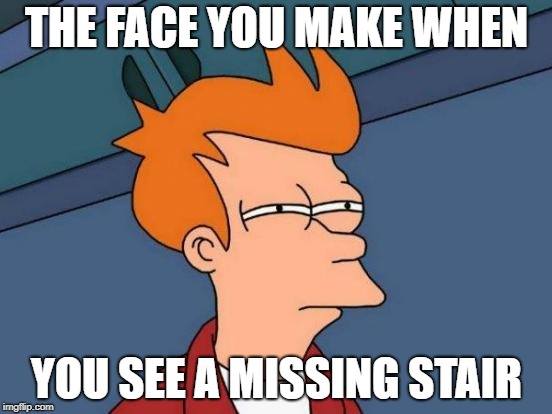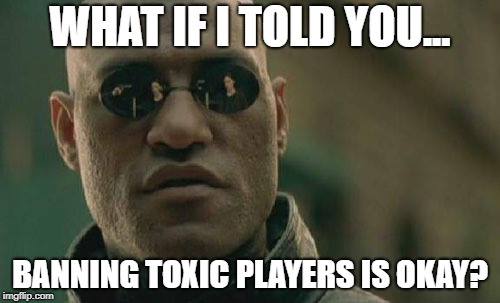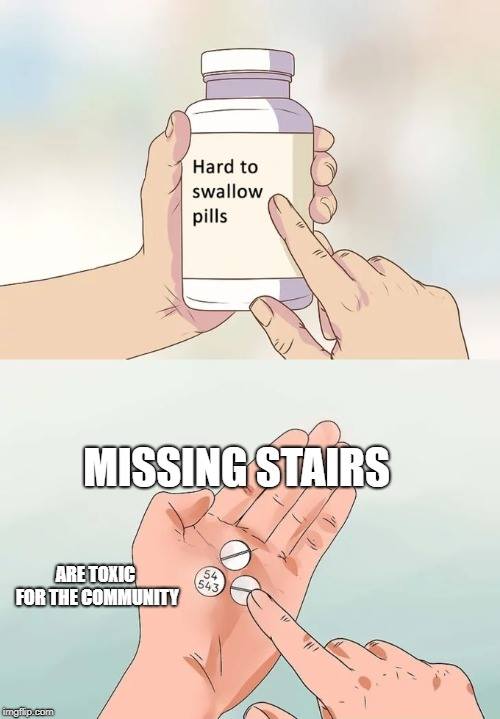You’ve seen it: the talk about missing stairs in larp. These insidious wrongdoers are the subject of substantial discussion in the larp community—but beyond their lasting, negative impact, how much do missing stairs impact the larp community financially?
After dealing with the fallout of a missing stair-related situation in a larp I was initially paid to help market, I took a look at the many hours I’d spent dealing with the issue in hopes of ameliorating the situation. I won’t get into specifics here: it isn’t my story to tell, and the person affected has expressed a desire to avoid discussion of the details. What I do want to discuss is the amount of time myself and others in the community—especially women and nonbinary community members—invested in handling this situation officially and unofficially. This is the labor of helping communities recover.
What Are Missing Stairs and Emotional Labor, and How Do They Relate?
Missing stairs are problems in any given community, and the international larp community is no exception. Specifically, missing stairs impact the larp community and violate a culture of trust and commit harassing and problematic scenarios, situations, and actions against others in the community, but the community often does not eject them. Instead, communities talk through backdoor channels about missing stairs, and sometimes, participants (especially new community members) don’t hear about missing stairs until it’s too late.
I noticed it because it hits me in the wallet. I’m an underemployed freelance writer and game designer. I scrape together just enough to get by, but when I spend time on things that don’t make money, I’m suddenly not able to pay for important expenses, like bills, and when I can’t pay bills, I certainly can’t larp, and when I cancel larp, I get depressed. So I noticed this impact after analyzing and tracking my habits: more talk about missing stair = less sleep = less productive time = less working = less money.
At my average consulting rate of roughly $50, this missing stair cost me about $700 (14 hours of emotional labor) that I could not afford to do without. Others in the community put at least as much effort in, whether they have higher paying, more stable jobs, or are piecing together an income like me. And again, they’re mostly not men, and they also command similar hourly rates. I know three others who specifically put time into it. That’s $2,800 of emotional labor (42 hours of emotional labor) right there, and we handled it quickly and efficiently because the community organizers were responsive and reacted properly.
Yes, I should have set a boundary and said no to the emotional labor. But when someone comes at me with information about a community leader being a safety issue, it’s not exactly ethical for me to step away. I need to follow through. And that’s how I got sucked in.
Let’s break it down further, and look at the cost of the missing stair in a larp community. We’ll use a fictional example so we can look at some more details.
Missing Stairs Impact the Larp Community: The Fictional Missing Stair Larp Scenario
A missing stair named Axe—a real known problem in the community—assaulted a nonbinary member of an American boffer larp community named Andre. Like a lot of boffer larpers in the Northeastern US, Andre and their friends, as well as the missing stair, attend many larps throughout the region. All of them also larp in other styles and at conventions from time to time, making the effects of this action rather widespread and potentially threatening to multiple communities. Andre and their friends were new to this particular larp and hadn’t yet been warned about the missing stair issue.
Please note that while missing stairs potentially affect international larp communities, I’m detailing a fictional experience in accordance with the larp communities I know—ones that are local to me. Lessons may or may not apply to other communities, but this should be helpful in understanding the issue all the same.
The Cost of ‘Axe,’ the Missing Stair
For this scenario, we will use the hourly emotional labor cost equivalent to the hourly average wage in the United States. That number is $23.05. While many marginalized community members make significantly less than this wage, I am committing to it to represent the strain of emotional labor in addition to the other difficulties marginalized community members face in general.
How do people find out about missing stairs? Larpers find out about missing stairs through multiple means, some more traumatic than others.
Whisper networks: These are private back channels, such as Facebook conversations, phone calls, and private gatherings, where two or more people privately discuss the problematic behavior of another community member. The good news: community members get informed. The bad news: it’s hard to inform everyone, especially people who are new to the community. Those new community members are often younger, don’t have a foothold or support system in the larp community, and they are likely to be taken advantage of by missing stairs.
Hours per missing stair, in a larp community of 100 regular players: 35 x $23.05 per hour.
Hourly rate (average median wage in US): $2,305.00 .
https://twitter.com/ashleyn1cole/status/952197928084533258
The missing stair assaults, harasses, or victimizes them: They find out first-person when they are the target of the missing stair’s problematic behavior. This is the most dangerous and unfortunate way to find out. It can also facilitate guilt: if a missing stair’s behavior is iffy but not overtly problematic, a well-meaning community member or ally may feel guilty upon learning about a more serious offense later.
I hesitate to put a monetary value on the suffering anyone endures as a survivor of assault or abuse. Having been there myself, you can’t put remunerations on an experience that unwillingly changes your life for the worst (at least for an amount of time). However, there are monetary costs associated with this, and often the victim bears the burdens:
Therapy: $75/session, 2x/month = $150, for one year = $1,800. (I used my rate as an uninsured patient via Maven Health.)
A victim comes forward at great personal cost, naming their abuser: Sometimes, survivors come out about their experiences. On top of the general difficulties of doing this, they understand that many will never look at them the same way again. I have seen this impact vary wildly, from empowering the victim to attend any larp they want, to shutting them out of all local larps and even impacting their work and job. Emotionally, they may never recover from such an incident and it is impossible and insulting to assign a value here.
Think about Hollywood examples like Bill Cosby or Harvey Weinstein. For decades, people tolerated their behavior—through no fault of their own, but due to patriarchal structures. This is what a missing stair looks like.
The Monetary Value of Emotional Labor
Emotional labor, as we define it in a contemporary context, describes the amount of mental processing done to accommodate various difficult situations. Specifically, it’s often labor women perform for men, usually invisibly. This is something we do on top of other tasks, which may include office work, domestic work, child care, and elder care.
I share a household with my partner (a man), and we have talked about this issue before. We contribute equally to rent, but because I perform the majority of the domestic tasks and responsibilities (easier for me to do, as I work from home), he pays the other household bills (utilities, internet) and buys our cleaning supplies. This isn’t an example that works for everyone, but it does work for us. I feel that I am putting in some extra labor, but it’s compensated for in another, fair way.
It’s not just the time it takes to do these tasks, but the emotional labor of scheduling and timing it all and thinking about it. It’s a bit stressful the week before we both go to two different larps, for example, to manage the laundry. It also refers to the emotional workload we give each other in the relationship, which we sometimes outsource to trusted friends as well.
In larp, how does that look? When a missing stair creates a problem with something they say or do, how does it affect me as a community participant and leader? Spoiler alert: it’s a lot of laundry, and it’s pretty damn dirty.
What Does Emotional Labor Look Like When Community Members Discover a Missing Stair?
Ask anyone who has been marginalized due to illness, race, gender, socioeconomic status, etc.: we take care of our own because that’s where we find empathy. I’ve received more emotional and financial support, for example, from other chronic illness sufferers than I have from people who live pain-free lives. The same applies to the larp community and those most sensitive to missing stair issues.
Here’s what happens when I find out about a missing stair:
Step 1: I want to keep my community safe. I do not have the option to step away from this issue as it would be unethical. Since safety always comes first, myself and other marginalized folks often take responsibility for protecting ourselves and the other members of the community. We have learned to do this work efficiently in a way not visible or obvious to more privileged members of the community. That’s not to exclude: it’s to put safety first—to triage immediate issues, and to make sure vulnerable community members aren’t in direct proximity to missing stairs and other abusers.
If I am in charge of a community, I’m responsible for investigating and banning. That’s part of the job (and since I run larps for profit, I include that in the role I am paid to do). Usually, it’s in the general community, however. That means I’m doing emotional labor without profiting.
The last time I did this for a community, it resulted in about 30 hours of unpaid emotional labor.
30 x $23.05 = $691.50. There were at least two other women performing the same amount of emotional labor in this particular circumstance (a situation similar to our example). That means the total rolls up to $2,074.50.
Step 2: Give more time and spoons than you have. This is the most problematic and crucial aspect of dealing with missing stairs in the larp community. It usually falls on the marginalized to do it, and marginalized larpers are already dealing with difficult issues such as racism, sexism, homophobia and discrimination against the LGBTQIA+ community, and chronic illness issues. Many, like me, are also at a financial disadvantage. Some, like me, also work in the larp community as all or part of their job. This can result in a loss of effective work hours and/or time with family. Let’s estimate 10 hours of burnout per community member dealing with the immediate situation. That’s $23.05 per hour x 10 = $230.50 x 3 people = $691.50.
Step 3: Provide free labor to keep the community safe, at risk of personal safety. This creates burnout, resentment, and a further lack of access to resources. If I can’t pay my bills, I shouldn’t be doing unpaid labor for anyone, even if I am keeping marginalized communities (and myself) safe. That’s about 3 hours per 3 people involved, or $207.45.
Who Handles Emotional Labor?
At least in the United States, marginalized groups, particularly women, usually handle the majority of emotional labor in work, home, and hobby situations. We now value the economic contributions of homemakers; why not the bearers of emotional labor?
Allegedly, it’s too difficult to calculate. Despite the fact that I’m atrocious at math, I’ve managed to calculate some of the free labor I do for the larp community. Admittedly, when I ask for help, I get it—and this is why. Others recognize it. But not everyone asks, and asking is awkward. For me, it only happens after a long road of guilt and self-hate. And yes, this is common, especially for women.
As a community member who does a fair amount of emotional labor, it’s obvious that this invisible, unpaid labor is requisite to keep communities safer and functional. But how do you even bill for that?
I’ve learned to bundle it. If I’m handling social media for a larp organization (and yes, there are some I’ve turned away despite needing the money), I recognize that handling social for them comes with also involves the emotional labor of dealing with:
- Dissatisfied customers
- Addressing (or ignoring) pervasive issues in the community
- Verbal fights and marginalization of community members on post comments
- Affiliation and association with a brand and decisions it makes
This is simple to do as a professional, but I find it especially challenging as a community member. I can’t hand in a bill nor assign a monetary value to that.
Why Don’t Larp Organizations Boot Missing Stairs?
There are many costs associated with actually booting missing stairs. Often, especially in a pre-#metoo world, victims don’t say anything. The emotional cost of silence is high, but outwardly, the community will still appear to be okay. This is dangerous, as the victim still suffers and the missing stair continues their behavior.
You can learn more about this in detail from experience designer, larp organizer, and safety expert Maury Brown:
I know of many larps, inclusive of rapists unwilling to accept or seek rehabilitative measures, operating ‘as usual’ because people like the guys. Costs are emotional, social, and financial:
Others will leave the larp and take their money with them: Let’s say an abuser remains in a larp per the organizers. The survivor from our example, Andre, and their two best friends choose to leave the larp over that decision. Aside from the cost of removing enthusiastic and ethical players from the larp community, there’s a financial cost. Andre, by the way, recruited one person per year to the larp, and was expecting bring another in this year. This results in four lost tickets this year, plus more in the future. (Boffer LARP tickets cost an average of $80 per player per session; average boffer player will participate as a PC in about 8 LARP events a year)
Here are the potential losses for the next year in our scenario:
- $2,305 = emotional labor cost of whisper network per stair
- $2,560 = lost revenue from people who left since the stair stuck around
- $1,800 = yearly therapy for one victim
- $2,074.50 = immediate triage safety
- $691.50 = Cost of burnout for community members doing triage
- $207.45 = Free labor to keep community safe
- $922.00 = (40 hours) Public relations, loss of community trust, and time to rebuild that trust
- $922.00 = (40 hours) Personal email, correspondence, and private conversations by organizer
This puts the conservative estimate at: $11,482.45 (not including potential legal fees, which could range anywhere from zero to tens of thousands of dollars).
Additionally:
- It takes time, money, and energy to deal with retaliation from the missing stair and their supporters; these people are often quite charming and bring with them their own cult of personality.
- Ousting any community member requires a strong existing community, which is difficult for new organizations.
- The charismatic missing stair is also influential in the larp community at large.
- Missing stairs make a stink; survivors often leave quietly.
- Fear of legal retribution, or lack of funds to deal with it.
Preventing Missing Stairs Isn’t Just Right, It’s Profitable
There are a lot of things that don’t make sense about healthcare in the United States (or rather, the lack of affordable, accessible health services). One thing that always gets me: it’s less expensive to prevent a problem or treat it when it’s smaller versus handle a large issue later.
Think about a tooth: it’s inexpensive, easier, and less painful to treat a small cavity. A root canal and a crown cost more time, money, effort, and pain.
Wouldn’t it make more sense to ensure all citizens have access to free dental cleanings versus have them wind up in a hospital, uninsured, needing an emergency root canal, further raising the costs of premiums and services to cover the expense?
That’s where we are in larp as well.
By not preventing missing stairs, we allow them, and we incur great cost.
While we can’t guarantee stair-proof larps, we can make every effort to improve larp safety.
So let’s say one slips through. It happens, even to the warmest of communities. What next?
The community must still respond. And while there’s a cost, it isn’t as bad as it could be if you don’t tackle the problem at the start, especially if you already have a plan in place. It’s like when you get a cavity despite regularly cleaning and brushing. It’s not ideal, but it’s still less painful and costly to fix than a tooth requiring a root canal, which also affects people like: the employer who has to grant time off for the procedure; the partner who has to drive the person to the dentist—there could also be other expenses involved for a person of any gender, like time away from children or household duties.
Additionally, people who have privilege, time, and money can take the lead on:
- Speaking up to prevent missing stairs from entering or acting improperly at larps, using their privilege to bar wrongdoers and model positive behavior.
- Listening to—and believing—members of the community who have been victimized, and supporting them in a response.
- Getting the word out about larps who are prepared to prevent, boot, and defend against missing stairs.
- Helping larps who aren’t prepared—encourage them to get with the program to earn your business.
- I’ve detailed just a few examples of costs, expenses, damages, and strains that missing stairs put on the larp community, as well as the ways in which marginalized community members must look after our own and manage the stress of missing stairs in addition to the difficulties in our own lives.
How do you resolve to step up and help out with this issue?
Note: I created this post with support from the larp community. Want to express your appreciation and encouragement, and help me write more posts like this one for the larp community? Buy me a coffee on ko-fi.
Author’s Note: Thank you to John Perkins for editing, meme making, and fact-checking.












